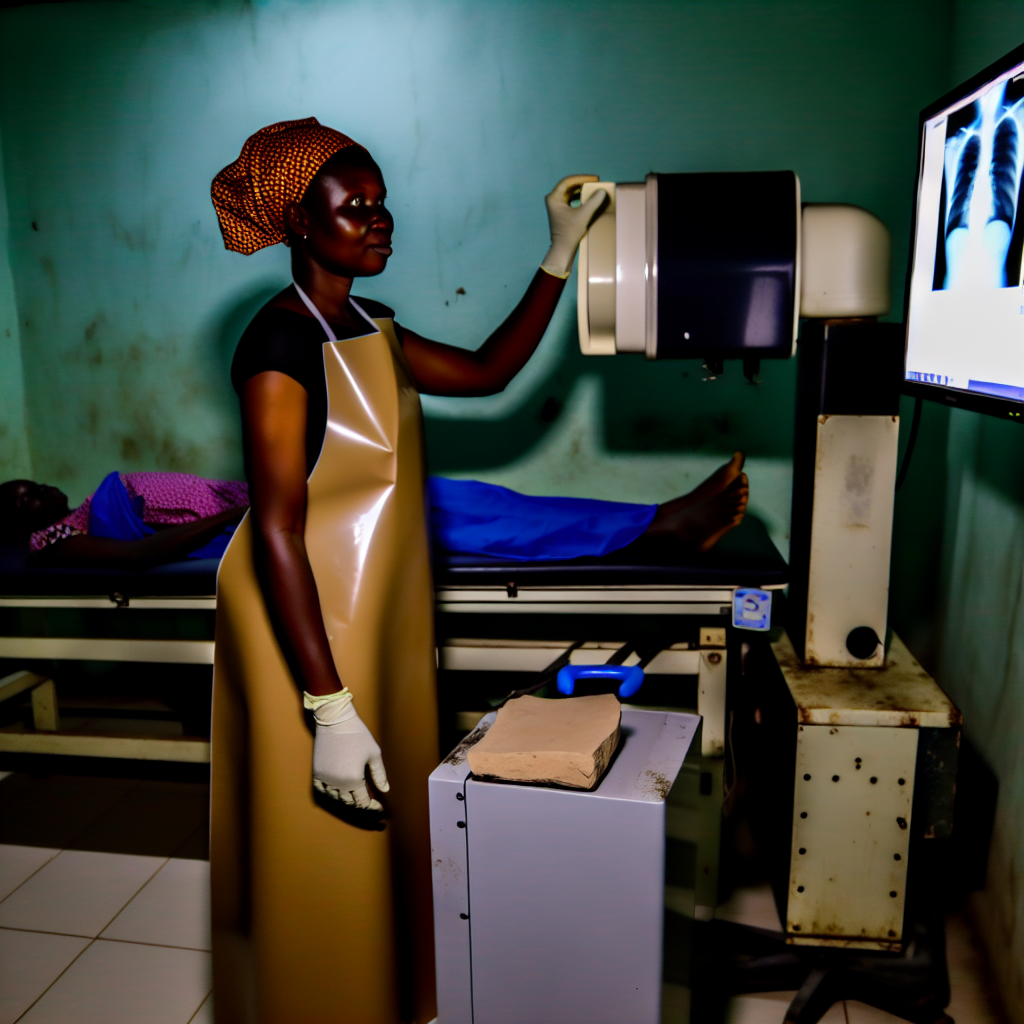Overview of Radiography as a Profession in Nigeria
Radiography is a vital healthcare profession in Nigeria.
It involves the use of medical imaging techniques to diagnose and treat diseases.
Choosing a Reputable Radiography School or Program
Selecting a well-established radiography school is crucial for receiving quality education and training in this field.
Purpose of the Blog Post
This blog aims to showcase the top radiography schools and programs in Nigeria.
It provides aspiring students with valuable information.
Top Radiography Schools and Programs in Nigeria
- University of Lagos: Known for its state-of-the-art facilities and experienced faculty in radiography.
- Obafemi Awolowo University: Offers a comprehensive radiography program with hands-on training.
- Ahmadu Bello University: Renowned for producing skilled radiographers through its rigorous curriculum.
- University of Nigeria, Nsukka: Provides a well-rounded radiography education with clinical exposure.
- Lagos State University: Known for its strong emphasis on practical skills development in radiography.
Considerations for Prospective Students
Choosing the right radiography school is essential for a successful career in this field.
Consider the reputation, facilities, faculty, and practical training offered by these top schools in Nigeria.
Accreditation of Radiography Schools
In the field of radiography, choosing a school that is accredited is crucial for your education and career prospects.
Accreditation ensures that the program meets specific quality standards set by accrediting bodies.
Importance of Accreditation
Accreditation is essential as it guarantees that the radiography program meets national standards for quality and effectiveness.
Attending an accredited school ensures that you will receive a high-quality education that is recognized by employers in the field.
Employers often prefer candidates who have graduated from accredited programs, as it signifies that the individual has received a comprehensive education that aligns with industry standards.
Accreditation also plays a role in the transfer of credits and eligibility for certification exams.
Accrediting Bodies for Radiography Programs in Nigeria
- National Universities Commission (NUC)
- Joint Admissions and Matriculation Board (JAMB)
- Medical Rehabilitation Therapists Board of Nigeria (MRTBN)
These accrediting bodies ensure that radiography programs in Nigeria adhere to set standards and guidelines, providing students with the assurance of a quality education.
Advantages of Attending an Accredited Radiography School
- Recognition by employers in the field
- Eligibility for certification exams
- Transferability of credits
- High-quality education
- Adherence to industry standards
- Better career prospects
Attending an accredited radiography school in Nigeria gives you a competitive edge in the job market and ensures that you are well-prepared for a successful career in the field of radiography.
Curriculum and Course Offerings
When it comes to pursuing a career in radiography in Nigeria, it is essential to understand the typical curriculum of a radiography program.
Additionally, comparing and contrasting the course offerings of the top radiography schools can help prospective students make informed decisions.
Moreover, practical training plays a crucial role in radiography education.
This allows students to gain hands-on experience and skills necessary for their future careers.
Typical Curriculum for a Radiography Program in Nigeria
The curriculum of a radiography program in Nigeria typically includes a combination of theoretical knowledge and practical skills necessary for a successful career in radiography.
Some of the key courses that students can expect to find in a radiography program include:
- Radiographic Anatomy
- Radiation Physics
- Medical Imaging Techniques
- Radiation Protection and Safety
- Diagnostic Imaging
- Radiographic Pathology
- Basic Life Support
These courses are designed to provide students with a strong foundation in radiography principles, patient care, and image interpretation.
Additionally, students may have the opportunity to take specialized courses in areas such as MRI, CT scans, or ultrasound, depending on the school’s curriculum.
Comparison of Course Offerings of Top Radiography Schools
Top radiography schools in Nigeria offer a variety of courses to help students develop the skills and knowledge needed to excel in the field of radiography.
While the core curriculum may be similar across different institutions, each school may have its unique course offerings or specialization areas.
For example, one school may focus more on advanced imaging techniques like MRI and CT scans.
Meanwhile, another school may emphasize radiation protection and safety.
It is essential for prospective students to research and compare the course offerings of various radiography schools to find the program that aligns with their career goals and interests.
Importance of Practical Training in Radiography Education
Practical training is a crucial component of radiography education as it allows students to apply theoretical knowledge in real-world settings.
This hands-on experience helps students develop essential skills such as positioning patients, operating imaging equipment, and ensuring patient safety during procedures.
Moreover, practical training provides students with the opportunity to work alongside experienced radiographers and healthcare professionals.
This allows students to gain valuable insights and mentorship.
This experiential learning enhances students’ technical abilities and prepares them for the challenges and demands of the workplace.
The curriculum of a radiography program in Nigeria typically includes a mix of theoretical courses and practical training.
This enables students to acquire the skills and knowledge needed for a successful career in radiography.
Comparing the course offerings of top radiography schools can help students choose the program that best fits their career aspirations.
Practical training is essential for developing hands-on skills and experience in the field.
Uncover the Details: Nutrition and Dietetics in Rural Nigeria: An Overview
Faculty Qualifications and Experience
When it comes to choosing a top radiography school in Nigeria, one of the key aspects to consider is the qualifications and experience of the faculty members.
Experienced and qualified faculty play a vital role in shaping the learning experience of students and preparing them for successful careers in the field of radiography.
Transform Your Career with Expert Guidance
Get personalized mentorship consulting that’s tailored to your unique path. Our expert advice is actionable and exclusive.
Get StartedEmphasize the significance of experienced and qualified faculty members
- Faculty members with years of experience bring practical knowledge to the classroom.
- Experienced faculty can provide real-world examples and case studies to enhance learning.
- Qualified faculty members are adept at keeping up with advancements in radiography technology.
- Experienced faculty can mentor students, providing guidance and support throughout their academic journey.
Highlight the credentials of the faculty members at the top radiography schools
- Faculty members at top radiography schools in Nigeria often hold advanced degrees in radiography.
- Many faculty members have certifications in specialized areas of radiography, such as MRI or CT scanning.
- Some faculty members may have extensive research experience in the field of radiography.
- Faculty members might also have professional memberships in radiography organizations, showcasing their commitment to the field.
Discuss how faculty expertise contributes to student learning and skill development
- Faculty expertise helps students gain a deeper understanding of complex radiography concepts.
- Experienced faculty can provide valuable insights and tips on how to excel in the field.
- Faculty members can offer practical training and hands-on experience to enhance student skills.
- Faculty expertise can inspire students to pursue further studies or research in radiography.
The qualifications and experience of faculty members at top radiography schools in Nigeria play a crucial role in shaping the educational experience of students.
Students benefit from the wealth of knowledge, practical experience, and mentorship provided by experienced and qualified faculty members, ultimately preparing them for successful careers in the field of radiography.
Explore Further: Cost of Studying Nursing Science in Nigeria
Facilities and Resources
State-of-the-art facilities and equipment are crucial for radiography education.
These cutting-edge resources allow students to learn and practice using the latest technology.
Access to high-quality facilities can significantly impact the quality of education and training.
Importance of State-of-the-Art Facilities and Equipment
State-of-the-art facilities and equipment play a vital role in radiography education.
These tools enable students to gain hands-on experience with advanced technology.
Preparing them for real-world scenarios in the field.
By working with state-of-the-art equipment, students can develop the skills and competencies needed to excel in their careers.
Comparison of Facilities and Resources
Different radiography schools vary in the resources they provide to students.
Some institutions may have state-of-the-art facilities with the latest equipment.
While others may have more limited resources.
It is essential for students to consider the available facilities and resources when choosing a radiography program.
Schools with better resources can offer a more comprehensive and practical learning experience.
Enhancing the Learning Experience
Access to resources can greatly enhance the learning experience for radiography students.
By having state-of-the-art facilities and equipment, students can learn through hands-on practice and simulation.
This practical experience allows students to develop the skills and confidence needed to succeed in the field.
Additionally, access to resources such as research labs, imaging centers, and clinical partnerships can provide students with valuable opportunities to apply their knowledge in real-world settings.
State-of-the-art facilities and resources are essential for a comprehensive radiography education.
By choosing a program with advanced equipment and facilities, students can gain valuable hands-on experience.
They can also develop the skills necessary to excel in their careers.
It is crucial for students to consider the resources available at different radiography schools to ensure they receive the best possible education and training.
Explore Further: Community Health Initiatives by Nigerian Dietitians
Role of Clinical Training in Radiography Education
Clinical training is an essential component of radiography education.
It allows students to work directly with patients, equipment, and healthcare professionals in a clinical setting.
This hands-on experience helps students develop the necessary skills and confidence to excel in their future careers.
Clinical Training Opportunities at Top Radiography Schools
- Obafemi Awolowo University (OAU): OAU provides students with clinical training opportunities at its teaching hospital, where they work alongside experienced radiographers in various departments such as diagnostic imaging, radiation therapy, and nuclear medicine.
- University of Ibadan: The University of Ibadan offers students the chance to participate in clinical rotations at University College Hospital, which is equipped with state-of-the-art imaging technologies for hands-on training.
- Ahmadu Bello University (ABU): ABU partners with reputable hospitals and imaging centers to offer students clinical training opportunities in radiography, giving them exposure to different imaging modalities and patient populations.
Benefits of Hands-On Experience in a Clinical Setting
There are several benefits of hands-on experience in a clinical setting for radiography students.
- Improved Technical Skills: Clinical training allows students to hone their technical skills in operating imaging equipment and positioning patients for accurate diagnostic images.
- Enhanced Communication Skills: Interacting with patients and healthcare professionals during clinical training helps students improve their communication skills, which are essential in a healthcare setting.
- Professional Networking: Clinical training provides students with the opportunity to network with radiography professionals, potentially leading to job opportunities and mentorship in the field.
- Real-World Exposure: Working in a clinical setting exposes students to real-world challenges and scenarios, giving them a practical understanding of the profession and preparing them for diverse clinical environments.
Clinical training plays a vital role in radiography education.
It offers students valuable hands-on experience that enhances their technical skills, communication abilities, and professional networking opportunities.
By providing clinical training opportunities, top radiography schools in Nigeria equip students with the skills and knowledge needed to succeed in the field of radiography.
Uncover the Details: Pioneering Nutrition and Dietetics Projects in Nigeria

Alumni Success and Job Placement
Showcase the success stories of alumni from top radiography schools.
Discuss the job placement rates of graduates from these schools.
Emphasize the importance of choosing a school with a strong track record of alumni success.
Success Stories of Alumni
In the field of radiography, success stories of alumni play a crucial role in inspiring current students.
Alumni from top radiography schools in Nigeria have gone on to achieve remarkable success in their professional lives.
For example, graduates from Alpha University have excelled in various roles such as radiographers, radiologists, and healthcare administrators.
Their success stories serve as motivation for aspiring radiography students.
This illustrates the impact of quality education in this field.
Job Placement Rates
One of the key factors to consider when choosing a radiography school is the job placement rates of its graduates.
Top radiography schools in Nigeria have consistently high job placement rates.
A significant percentage of alumni secure employment soon after graduation.
For instance, Beta College boasts a job placement rate of over 90% for its radiography graduates.
This demonstrates the strong demand for radiography professionals in the healthcare industry.
It also reflects the confidence employers have in the quality of education provided by these schools.
Importance of Alumni Success
Choosing a school with a proven track record of alumni success is crucial for aspiring radiography students.
Alumni success not only reflects the quality of education provided by the institution.
It also serves as a testament to its reputation and credibility in the industry.
Schools that consistently produce successful alumni demonstrate their commitment to excellence.
They have a strong network of professionals who can support and mentor current students.
Therefore, selecting a top radiography school with a history of alumni success can significantly impact an individual’s career prospects.
These opportunities for advancement in the field are vital for future success.
Tuition and Financial Aid Options
When considering pursuing a radiography program in Nigeria, one of the crucial factors to consider is the tuition fees.
Tuition Fees for Radiography Programs in Nigeria
- On average, tuition fees for radiography programs in Nigeria range from ₦200,000 to ₦500,000 per year.
- Some universities may have slightly higher tuition fees, depending on the level of accreditation and facilities available.
- It is essential to research and compare tuition fees from different institutions to find the best option that fits your budget.
Availability of Financial Aid Options
- Financial aid options for radiography programs in Nigeria are limited compared to Western countries.
- However, some institutions offer scholarships, grants, or work-study programs to assist students with financial needs.
- Students can also explore external funding sources such as government scholarships or private sponsorships.
Tips on How to Finance a Radiography Education in Nigeria
- Start by researching available scholarships and grants specifically designed for radiography students.
- Consider part-time work or internship opportunities to gain practical experience while funding your education.
- Explore student loan options offered by financial institutions, although it is essential to evaluate the terms and conditions carefully.
- Network with professionals and alumni in the radiography field who may provide mentorship or guidance on financial aid options.
By being proactive in searching for financial aid options and exploring different avenues to finance your radiography education, you can make your academic journey more affordable and accessible.
Choosing the Right Radiography School in Nigeria
After exploring the top radiography schools and programs in Nigeria, it is crucial to recap the key points discussed in this blog post.
Prospective radiography students should carefully consider their options before choosing a school, to ensure they receive the best education possible.
Quality education plays a significant role in preparing individuals for a successful career in radiography.
Investing time and effort into selecting the right school and program can make a substantial impact on one’s future prospects in this field.
It is important to prioritize accredited institutions with experienced faculty and comprehensive curriculum.
By making informed decisions and seeking out reputable institutions, aspiring radiography students can set themselves up for success and establish a strong foundation in this competitive field.
It is essential to prioritize education as a crucial step towards achieving a rewarding and fulfilling career in radiography.
Additional Resources
Abimiku, Alash’le | University of Maryland School of Medicine




